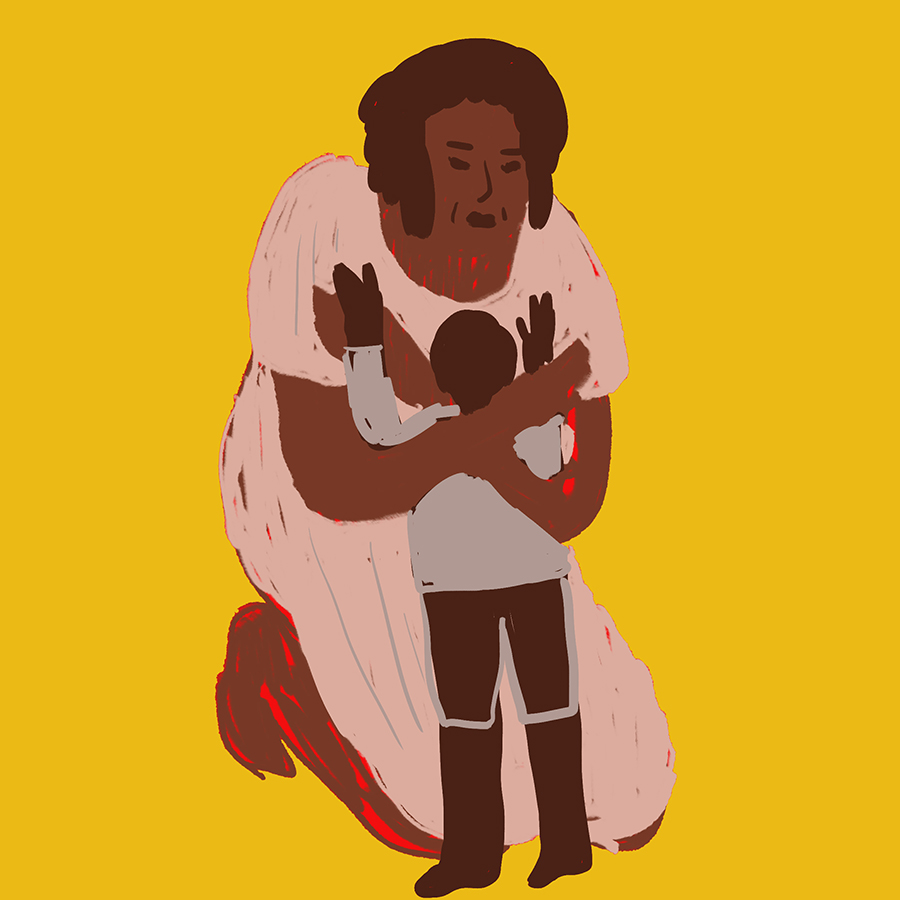Summary
At the close of a summer day the narrator sits on a farmhouse porch atop a hill. A sixty-year-old black servant, Aunt Rachel, sits respectfully on a lower step cheerfully enduring merciless chafing. As the powerful woman roars with laughter, the narrator asks her how it is that she has never had any trouble. Taken aback, she replies, “Misto C——, is you in ’arnest?” Sobered by her manner, he explains that he has never seen her other than cheerful. Aunt Rachel becomes grave and begins her story.
Rachel tells the narrator that even though she was once a slave, she had a husband as loving to her as he is to his own wife, and that they had seven children whom they dearly loved. She was raised in Virginia (“ole Fo-ginny”), but her quick-tempered mother was raised in Maryland and was fiercely proud of her heritage. One day when Rachel’s little son Henry cut his wrist and forehead badly, everyone flew around, anxious to help him. In their excitement, they spoke back to Rachel’s mother, who snapped, “I wan’t bawn in de mash to be fool’ by trash! I’s one o’ de ole Blue Hen’s Chickens, I is!” She then cleared everyone out and bandaged the boy herself. Rachel adds that she uses her mother’s expression herself when she gets riled.
As Rachel recalls the time when her mistress went broke and auctioned off all her slaves in Richmond, she warms to her subject and gradually rises, until she towers over the narrator. Her recollection of the slave auction is vivid. One by one, her husband and children were sold and she was beaten as she cried in protest. When only her youngest child, Henry, remained, she held him tightly, threatening to kill anyone who touched him. Henry whispered to her that he would run away and work so that he could buy her freedom. Despite Rachel’s fierce resistance, Henry was eventually taken away. Since that day, twenty-two years ago, Rachel has not set eyes on her husband or six of her children.
The man who bought Rachel took her to “Newbern” (New Bern, North Carolina?), where she became the family cook. During the war her master became a Confederate colonel, but when the Union took the town, he fled, leaving his slaves behind. Union Army officers then occupied the house and Rachel cooked for them. These officers treated her respectfully and gave her unquestioned command over her kitchen.
Remembering Henry’s vow to escape to the North, Rachel one day asked the officers if they might have seen him. She described Henry as very little, with scars on his wrist and forehead, but a general reminded her that after thirteen years Henry would now be a man—something that she had forgotten. She did not then know that Henry had indeed run off to the North, worked as a barber for years, and hired himself out to Union officers so that he could ransack the South looking for his mother.
Now the Union headquarters, Rachel’s house was often the site of soldier balls, during which she jealously guarded her kitchen. One night, there was a ball for black soldiers, who particularly irritated her. When a spruce young man danced into her kitchen with a woman, she said, “Gid along wid you!—rubbage!” The remark made the man’s expression momentarily change. Other men then came in, playing music and putting on airs. Rachel tried to drive them out, but they merely laughed until she straightened up and said, “I want you niggers to understan’ dat I wa’nt bawn in de mash to be...
(This entire section contains 722 words.)
See This Study Guide Now
Start your 48-hour free trial to unlock this study guide. You'll also get access to more than 30,000 additional guides and more than 350,000 Homework Help questions answered by our experts.
Already a member? Log in here.
fool’ by trash! I’s one o’ de ole Blue Hen’s Chickens, I is!” Again the young man seemed to react to her words.
As Rachel finally drove the men from her kitchen, she overheard the young man tell a companion that he would not return with the others that night. Early the next morning, as Rachel removed biscuits from the oven, the same young man unexpectedly reappeared and looked her closely in the eye. Suddenly she knew. She dropped her pan and examined his scarred wrist and forehead. It was her Henry.
“Oh, no, Misto C——,” Rachel says, “I hain’t had no trouble. An’ no joy!”
